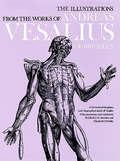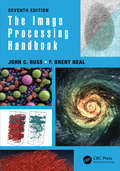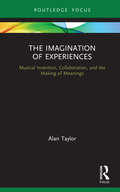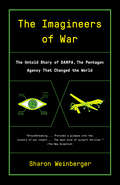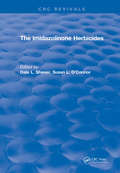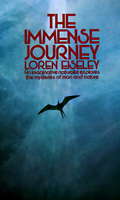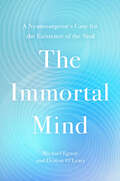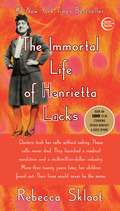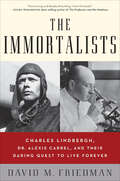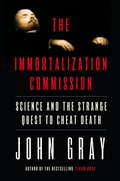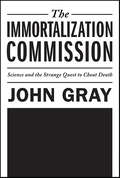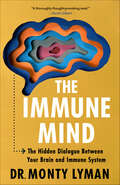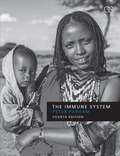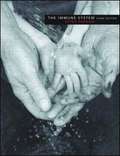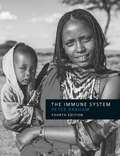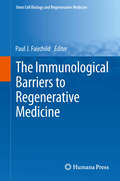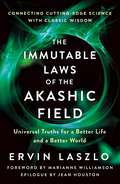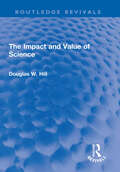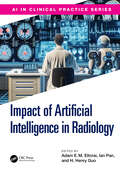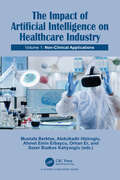- Table View
- List View
The Illustrations from the Works of Andreas Vesalius of Brussels
by J. B. Saunders Charles O’MalleyThe works of Andreas Vesalius (1514–1564) have long been regarded among the great treasures of the Renaissance. Published as medical books while he was teaching anatomy and dissection at the University of Padua, they include the Tabulae Sex (1538), intended as an aid to students; the magnificently illustrated De Humani Corporis Fabrica (1543), and the companion volume, the Epitome (1543). Individually, these books are milestones in the history of medicine. They also offer one of the most magnificent collections of anatomical drawings ever published. The plates were executed with such vitality and originality that they have been attributed to the most talented illustrators of the sixteenth century, not to mention Vesalius himself. Many of the drawings, in fact, were products of Titian's famous atelier. For this edition of the Vesalius illustrations, Dover has combined the best existing plates and text. The illustrations have been reproduced from the sumptuous (1934) Munich edition of Vesalius titled Icones Anatomicae. The Munich plates were struck for the most part from the original wood blocks then in the collection of the Library of the University of Munich. These priceless art objects were destroyed in the bombing of Munich during World War II. Aside from the original copies of the woodcuts (of which only a few complete sets are known), the Munich restrikes are the best representations of the Vesalian anatomical drawings, for they preserve much of the freshness and richness of the 1543 edition. The text of this Dover edition has been faithfully reproduced from an edition of Vesalius published by World Publishing Company in 1950. The editors, distinguished authorities on sixteenth-century medicine, have provided a very comprehensive history of Vesalius, his career, and excellent explanations of the legends surrounding the illustrators, artists, and publishers involved with the production of his books. No other source will provide the general reader, bibliophile, art historian, artist, or historian of science and medicine with such complete data on Vesalius and his fabulous anatomical illustrations.
The Image Processing Handbook
by John C. Russ F. Brent NealConsistently rated as the best overall introduction to computer-based image processing, The Image Processing Handbook covers two-dimensional (2D) and three-dimensional (3D) imaging techniques, image printing and storage methods, image processing algorithms, image and feature measurement, quantitative image measurement analysis, and more.Incorporating image processing and analysis examples at all scales, from nano- to astro-, this Seventh Edition: Features a greater range of computationally intensive algorithms than previous versions Provides better organization, more quantitative results, and new material on recent developments Includes completely rewritten chapters on 3D imaging and a thoroughly revamped chapter on statistical analysis Contains more than 1700 references to theory, methods, and applications in a wide variety of disciplines Presents 500+ entirely new figures and images, with more than two-thirds appearing in color The Image Processing Handbook, Seventh Edition delivers an accessible and up-to-date treatment of image processing, offering broad coverage and comparison of algorithms, approaches, and outcomes.
The Imagination of Experiences: Musical Invention, Collaboration, and the Making of Meanings
by Alan TaylorAimed at lay, student, and academic readers alike, this book concerns the imagination and, specifically, imagination in music. It opens with a discussion of the invalidity of the idea of the creative genius and the connected view that ideas originate just in the individual mind. An alternative view of the imaginative process is then presented, that ideas spring from a subconscious dialogue activated by engagement in the world around. Ideas are therefore never just of our own making. This view is supported by evidence from many studies and corresponds with descriptions by artists of their experience of imagining. The third subject is how imaginations can be shared when musicians work with other artists, and the way the constraints imposed by trying to share subconscious imagining result in clearly distinct forms of joint working. The final chapter covers the use of the musical imagination in making meanings from music. The evidence is that music does not communicate meanings directly, and so composers or performers cannot be looked to as authorities on its meaning. Instead, music is commonly heard as analogous to human experience, and listeners who perceive such analogies may then imagine their own meanings from the music.
The Imagineers of War: The Untold Story of DARPA, the Pentagon Agency That Changed the World
by Sharon WeinbergerThe definitive history of the Defense Advanced Research Projects Agency, the Pentagon agency that has quietly shaped war and technology for nearly sixty years.Founded in 1958 in response to the launch of Sputnik, the agency’s original mission was to create “the unimagined weapons of the future.” Over the decades, DARPA has been responsible for countless inventions and technologies that extend well beyond military technology. Sharon Weinberger gives us a riveting account of DARPA’s successes and failures, its remarkable innovations, and its wild-eyed schemes. We see how the threat of nuclear Armageddon sparked investment in computer networking, leading to the Internet, as well as to a proposal to power a missile-destroying particle beam by draining the Great Lakes. We learn how DARPA was responsible during the Vietnam War for both Agent Orange and the development of the world’s first armed drones, and how after 9/11 the agency sparked a national controversy over surveillance with its data-mining research. And we see how DARPA’s success with self-driving cars was followed by disappointing contributions to the Afghanistan and Iraq wars.Weinberger has interviewed more than one hundred former Pentagon officials and scientists involved in DARPA’s projects—many of whom have never spoken publicly about their work with the agency—and pored over countless declassified records from archives around the country, documents obtained under the Freedom of Information Act, and exclusive materials provided by sources. The Imagineers of War is a compelling and groundbreaking history in which science, technology, and politics collide.
The Imidazolinone Herbicides (CRC Press Revivals)
by Dale L Shaner Susan L O'ConnorThis book presents detailed information on the imidazolinone herbicides, provided in chapters contributed by scientists and product development managers who work for American Cyanamid, categorized in sections covering chemistry, biology, metabolism and residues, environmental fate and product performance. Each chapter has its own bibliography, and appendices give (a) details of the chemical and physical properties, formulations and trade names of imazapyr, imazamethabenz-methyl, imazethapyr and imazaquin, and (b) the scientific and common names of species used in the text. There is a general bibliography of references for each of the above imidazolinone herbicides and a useful subject index. The individual chapters are abstracted separately.
The Immense Journey
by Loren C. EiseleyAnthropologist and naturalist Loren Eiseley blends scientific knowledge and imaginative vision in this story of man.
The Immortal Mind: A Neurosurgeon's Case for the Existence of the Soul
by Denyse O'Leary Michael EgnorA neuroscientist and surgeon makes an argument for the existence of a spiritual human soul in this eye-opening book. Many scientists and doctors believe that there is no such thing as the soul. That there is no part of us that persists beyond death. We are not spiritual in any respect. We are made up of cells and tissue, and completely controlled by a material organ in our heads: the brain. In this groundbreaking book, Dr. Michael Egnor makes the case—based on 40 years of practice and over 7,000 brain surgeries—that science has gotten it all wrong. The human brain is incredible, mysterious, and powerful. But it&’s not what makes us who we are. The soul does that. Drawing on the most important research studies in neuroscience, Dr. Egnor presents evidence that the brain alone does not explain the mind. He explores, using modern neuroscience and his vast surgical experience, how inside every damaged brain there is a thinking, feeling person with a spiritual soul that transcends the brain. He also uses fascinating case studies to show how research on conjoined twins who share parts of their brains, on patients in deep coma who are still able to communicate with people around them, on near-death experiences, and on artificial intelligence all make a scientific case for the existence of the spiritual human soul. Engaging, thought-provoking, and groundbreaking, The Immortal Mind shows here that some aspect of who we are is spiritual and immortal, transcending the physical body.
The Immortal life of Henrietta Lacks
by Rebecca Skloot<P>Her name was Henrietta Lacks, but scientists know her as HeLa. She was a poor Southern tobacco farmer who worked the same land as her slave ancestors, yet her cells-taken without her knowledge-became one of the most important tools in medicine. <P>The first “immortal” human cells grown in culture, they are still alive today, though she has been dead for more than sixty years. If you could pile all HeLa cells ever grown onto a scale, they’d weigh more than 50 million metric tons-as much as a hundred Empire State Buildings. HeLa cells were vital for developing the polio vaccine, uncovered secrets of cancer, viruses, and the atom bomb’s effects; helped lead to important advances like in vitro fertilization, cloning, and gene mapping; and have been bought and sold by the billions. Yet Henrietta Lacks remains virtually unknown, buried in an unmarked grave. <P>Now Rebecca Skloot takes us on an extraordinary journey, from the “colored” ward of Johns Hopkins Hospital in the 1950s to stark white laboratories with freezers full of HeLa cells; from Henrietta’s small, dying hometown of Clover, Virginia-a land of wooden slave quarters, faith healings, and voodoo-to East Baltimore today, where her children and grandchildren live and struggle with the legacy of her cells. <P>Henrietta’s family did not learn of her “immortality” until more than twenty years after her death, when scientists investigating HeLa began using her husband and children in research without informed consent. And though the cells had launched a multimillion-dollar industry that sells human biological materials, her family never saw any of the profits. As Rebecca Skloot so brilliantly shows, the story of the Lacks family-past and present-is inextricably connected to the dark history of experimentation on African Americans, the birth of bioethics, and the legal battles over whether we control the stuff we are made of. <P>Over the decade it took to uncover this story, Rebecca became enmeshed in the lives of the Lacks family-especially Henrietta’s daughter Deborah, who was devastated to learn about her mother’s cells. She was consumed with questions: Had scientists cloned her mother? Did it hurt her when researchers infected her cells with viruses and shot them into space? What happened to her sister, Elsie, who died in a mental institution at the age of fifteen? And if her mother was so important to medicine, why couldn’t her children afford health insurance? <P>Intimate in feeling, astonishing in scope, and impossible to put down,The Immortal Life of Henrietta Lackscaptures the beauty and drama of scientific discovery, as well as its human consequences. <P><b>A New York Times Bestseller</b>
The Immortalists: Charles Lindbergh, Dr. Alexis Carrel, and Their Daring Quest to Live Forever
by David M. FriedmanHis historic career as an aviator made Charles Lindbergh one of the most famous men of the twentieth century, the subject of best-selling biographies and a hit movie, as well as the inspiration for a dance step—the Lindy Hop—that he himself was too shy to try. But for all the attention lavished on Lindbergh, one story has remained untold until now: his macabre scientific collaboration with Dr. Alexis Carrel. This oddest of couples—one a brilliant Nobel Prize-winning surgeon turned social engineer, the other a failed dirt farmer turned hero of the skies—joined forces in 1930 driven by a shared and secret dream: to conquer death and attain immortality.Part Frankenstein, part The Professor and the Madman, and all true, The Immortalists is the remarkable story of how two men of prodigious achievement and equally large character flaws challenged nature's oldest rule, with consequences—personal, professional, and political—that neither man anticipated.
The Immortalization Commission
by John GrayA great philosopher will change the way you think about your life.For most of human history, religion provided a clear explanation of life and death. But in the late 19th and early 20th centuries new ideas -- from psychiatry to evolution to Communist -- seemed to suggest that our fate was now in our own hands. We would ourselves become God.This is the theme of a remarkable new book by one of the world's greatest lving philosophers. It is a brilliant and frightening look at the problems and opportunities of a world coming to grips with humankind's now solitary, unaided place in the universe. Gray takes two major examples: the belief that the science-backed Communism of the new USSR could reshape the planet, and the belief among a group of Edwardian intellectuals -- popularized through mediums and automatic writing -- that there was a non-religious form of life after death.Gray presents an extraordinary cast of philosophers, journalists, politicians, charlatans and mass murderers, all of whom felt driven by a specifically scientific and modern world view. He raises a host of fascinating questions about what it means to be human. The implications of Gray's book will haunt its readers for the rest of their lives.From the Hardcover edition.
The Immortalization Commission: Science and the Strange Quest to Cheat Death
by John GrayA Globe and Mail Best Books of the Year 2011 TitleAt the heart of human experience lies an obsession with the nature of death. Religion, for most of history, has provided an explanation for human life and a vision of what comes after it. But in the late nineteenth and early twentieth centuries, such beliefs came under relentless pressure as new ideas—from psychiatry to evolution to communism—seemed to suggest that our fate was now in our own hands: humans could cease to be animals, defeat death, and become immortal.In The Immortalization Commission, the acclaimed political philosopher and critic John Gray takes a brilliant and frightening look at humankind's dangerous striving toward a scientific version of immortality. Probing the parallel faiths of Bolshevik "God-builders," who sought to reshape the planet and psychical researchers, who believed they had evidence of a nonreligious form of life after death, Gray raises fascinating questions about how such beliefs threaten the very nature of what it means to be human. He looks to philosophers, journalists, politicians, charlatans, and mass murderers who all felt driven by a specifically scientific and modern worldview and whose revolt against death resulted in a series of experiments that ravaged whole countries. An urgent examination of Darwin's post-religious legacy, The Immortalization Commission is an important work from "one of Britain's leading public intellectuals" (The Wall Street Journal).
The Immune Mind: The Hidden Dialogue Between Your Brain and Immune System
by Monty LymanDelving into the recent discovery of the brain's immune system, Dr. Monty Lyman reveals the extraordinary implications for our physical and mental health.Until a decade ago, we misunderstood a fundamental aspect of human health. Although the brain and the body have always been viewed as separate entities—treated in separate hospitals—science now shows that they are intimately linked.Startlingly, we now know that our immune system is in constant communication with our brain and can directly alter our mental health. This has opened up a new frontier in medicine. Could inflammation cause depression, and could arthritis drugs cure it? Can gut microbes alter your mood? Can something as simple as brushing your teeth properly reduce your risk of dementia? Could childhood infections lie behind neurological and psychiatric disorders such as tics and obsessive compulsive disorder?In The Immune Mind, Dr. Monty Lyman explores the fascinating connection between the mind, immune system, and microbiome. A specialist in the cutting-edge field of immuno-psychiatry, Lyman argues that we need to change the way we treat disease and the way we see ourselves. For the first time, we have a new approach to medicine that treats the whole human being.
The Immune Synapse: Methods and Protocols (Methods in Molecular Biology #2654)
by Cosima T. Baldari Michael L. DustinThis new collection features the most up-to-date essential protocols that are currently being used to study the immune synapse. Beginning with methods for making biophysical measurements, the volume continues by covering the cell biology of synapses, methods for advanced substrate engineering, mechanobiology topics, new technologies to describe and manipulate synaptic components, as well as methods related to sites of action and immunotherapy. Written for the highly successful Methods in Molecular Biology series, chapters include introductions to their respective topics, lists of the necessary materials and reagents, step-by-step and readily reproducible laboratory protocols, and tips on troubleshooting and avoiding known pitfalls. Authoritative and fully updated, The Immune Synapse: Methods and Protocols, Second Edition serves as an ideal practical guide for researchers working in this dynamic field. Chapters 5, 11, 18, 27, 30, and 32 are available open access under a Creative Commons Attribution 4.0 International License via link.springer.com.
The Immune System
by Peter ParhamThe Immune System, Fourth Edition emphasizes the human immune system and presents immunological concepts in a coherent, concise, and contemporary account of how the immune system works. Written for undergraduate, medical, veterinary, dental, and pharmacy students, it makes generous use of medical examples to illustrate points. This classroom-proven
The Immune System (3rd edition)
by Peter ParhamParham (structural biology, microbiology, immunology, Stanford U.) offers a third edition to his textbook explaining the functions of the human immune system. It is specifically intended for undergraduate students in medical, dental, and pharmacy in immunology courses. Extensively updated, the textbook includes new chapters on innate and adaptive immunity, enhanced treatment of aspects of innate immunity such as the complement system and defensins, immunotherapies, and the nature of immune response in mucosal tissues and immunological memory. It is well-illustrated and includes essay, multiple choice, and case study questions at the conclusion of each chapter. Annotation ©2009 Book News, Inc., Portland, OR (booknews.com)
The Immune System (Fourth Edition)
by Peter ParhamThe Immune System, Fourth Edition emphasizes the human immune system and presents immunological concepts in a coherent, concise, and contemporary account of how the immune system works. Written for undergraduate, medical, veterinary, dental, and pharmacy students, it makes generous use of medical examples to illustrate points. This classroom-proven textbook offers clear writing, full-color illustrations, and section and chapter summaries that make the book accessible and easily understandable to students. The Fourth Edition is a major revision that brings the content up-to-date and improves clarity. Based on user feedback, there is now increased continuity and connectivity between chapters. The Immune Systemis additionally supported by the Garland Science Learning System. This homework platform is designed to evaluate and improve student performance and allows instructors to select assignments on specific topics and review the performance of the entire class, as well as individual students, via the instructor dashboard. Students receive immediate feedback on their mastery of the topics, and will be better prepared for lectures and classroom discussions. The user-friendly system provides a convenient way to engage students while assessing progress. Performance data can be used to tailor classroom discussion, activities, and lectures to address students' needs precisely and efficiently. For more information and sample material, visit http://garlandscience. rocketmix. com/. A free trial for the Garland Science Learning System will be available to use during the Fall 2016 and Spring 2017 semesters. Please contact us directly at science@garland. comto sign up!
The Immunogenetics of Dermatologic Diseases (Advances in Experimental Medicine and Biology #1367)
by Nima Rezaei Fateme RajabiThis book intends to investigate the broad spectrum of genetic changes in immunological processes involved in cutaneous diseases. One of the main goals of immunogenetic studies is finding susceptibility genes for complex diseases. This can provide an insight into the pathogenesis of the condition in a way that is not easily achievable through other kinds of studies. Thus they are a rational initial step for generating hypotheses about disease pathogenesis. This may especially benefit dermatology, a field notorious for having too many diseases with unknown etiologies.Immunogenetic investigations have made targeted treatment strategies possible for diseases such as psoriasis and pemphigus. Even though these strategies have revolutionized the management of chronic dermatological conditions such as psoriasis, still there are a lot of unanswered questions. For instance, psoriasis patients respond very differently to each of the commercially available biological agents. This diversity could be partially explained by the differences in the sets of genes responsible for disease induction in each individual. Thus whole genome sequencing strategies, if feasible at individual levels, might help in tailoring these targeted treatments based on specific genetic backgrounds.Our intention in preparing this book was to explore the broad spectrum of the genetic aspects of immunological processes involved in cutaneous diseases. We have tried to cover most areas of dermatology where enough studies were available to gather a chapter. Still, there is a substantial lack of knowledge on the immunogenetics of many dermatological conditions. We hope that this book would encourage the investigators to fill these gaps of knowledge.
The Immunological Barriers to Regenerative Medicine
by Paul J. FairchildThis volume offers an analysis of the scale and nature of the immunological issues facing regenerative medicine, drawing on the expertise of laboratories around the world who have taken up the challenge of applying their expertise in immunology to the vagaries of stem cell biology. In Part I, we explore the extent to which the principles of allograft rejection, learned over several decades from our experiences of whole organ transplantation, apply within the unique context of cell replacement therapy. Part II discusses various innovative ways of addressing the issues of immunogenicity, while, in Part III, we focus exclusively on the induction of immunological tolerance through a variety of novel approaches. It is our hope that this systematic analysis of the current state of the field will galvanise efforts to solve an issue which has so far remained intractable.
The Immunology of Cardiovascular Homeostasis and Pathology
by Susanne Sattler Teresa Kennedy-LydonCardiovascular immunology is a newly emerging research area, investigating the crosstalk between the cardiovascular and the immune system. This crosstalk is evident through (1) crucial immunological capacities and functions of cardiovascular cell types, including cardiomyocytes, fibroblasts, endothelial cells, pericytes and cardiac resident macrophages, (2) the impact of aberrant immune function on the development of cardiovascular disease such as atherosclerosis, direct and indirect immune-mediated heart disease and vasculitis, and (3) the crucial role of the immune system in cardiac repair and regeneration. The Immunology of Cardiovascular Homeostasis and Pathology covers all these aspects of cardiovascular immunology, starting with homeostatic immunological functions of traditional cardiovascular cell types, and moving then to the role of the immune system in cardiovascular pathology and to recent research into targeting the immune system to boost cardiac healing and regeneration.
The Immutable Laws of the Akashic Field: Universal Truths for a Better Life and a Better World
by Ervin LaszloConnecting Cutting-Edge Science with Classical WisdomThe Akashic Field is a cosmic field in which all information and knowledge is interconnected and preserved. Our very reality is anchored in this vast sea of connected information that gives rise to everything—from specks of stardust in the outer cosmos to consciousness itself. In The Immutable Laws of the Akashic Field, Dr. Ervin Laszlo, renowned authority in the fields of new science, consciousness, and spirituality, has written an accessible introduction to the mysteries of the Akashic Field, explaining how leading science supports this ancient intuition of the deep reality of the universe. The Immutable Laws of the Akashic Field also features contributions from other leading voices, including Dr. Maria Sagi, Christopher M. Bache, and Kingsley L. Dennis along with a foreword by Marianne Williamson. This approachable text offers a brilliant introduction to and bold affirmation of one of the most profound wonders of our universe.
The Impact and Value of Science (Routledge Revivals)
by Douglas W. HillFirst published in 1945, The Impact and Value of Science is both a plea and a challenge: a plea for more and more science – not to increase the sum total of technical knowledge nor to extend present material amenities, but in the words of the author for the sake of "mental maturity." It is a challenge to try the method of science. Every man is a scientist and every scientist a useful citizen. Dr. Hill has been both an industrial and academic scientist but here he is concerned with something much wider than textbook conception of science. He gives a clear answer to those who argue that scientific progress is leading to man’s destruction by showing that if the scientific method is applied in "non-scientific" fields – in religion, ethics, politics – man will learn how to use the technical inventions of science as stepping stones in social and economic progress. With space tourism and climate crisis marking the two ends of scientific development in current times, this book is of value to everyone but especially to students of climate change, public policy and ethics.
The Impact of Artificial Intelligence in Radiology (AI in Clinical Practice)
by Adam E. M. Eltorai, Ian Pan, and H. Henry GuoImplementation of artificial intelligence (AI) in radiology is an important topic of discussion. Advances in AI—which encompass machine learning, artificial neural networks, and deep learning—are increasingly being applied to diagnostic imaging. While some posit radiologists are irreplaceable, certain AI proponents have proposed to "stop training radiologists now." By compiling perspectives from experts from various backgrounds, this book explores the current state of AI efforts in radiology along with the clinical, financial, technological, and societal perspectives on the role and expected impact of AI in radiology.
The Impact of Artificial Intelligence on Healthcare Industry: Volume 1: Non-Clinical Applications
by Sezer Bozkus Kahyaoglu Mustafa Berktas Abdulkadir Hiziroglu Ahmet Emin Erbaycu Orhan ErHealthcare and medical science are inherently dependent on technological advances and innovations for improved care. In recent times we have witnessed a new drive in implementing these advances and innovations through the use of Artificial Intelligence, in both clinical and non-clinical areas.The set of 2 volumes aims to make available the latest research and applications to all, and to present the current state of clinical and non-clinical applications in the health sector and areas open to development, as well as to provide recommendations to policymakers. This volume covers non-clinical applications. The chapters covered in this book have been written by professionals who are experts in the healthcare sector and have academic experience.
The Impact of Automatic Control Research on Industrial Innovation: Enabling a Sustainable Future (IEEE Press Series on Control Systems Theory and Applications)
by Silvia Mastellone Alex Van DelftThe Impact of Automatic Control Research on Industrial Innovation Bring together the theory and practice of control research with this innovative overview Automatic control research focuses on subjects pertaining to the theory and practice of automation science and technology subjects such as industrial automation, robotics, and human???machine interaction. With each passing year, these subjects become more relevant to researchers, policymakers, industrialists, and workers alike. The work of academic control researchers, however, is often distant from the perspectives of industry practitioners, creating the potential for insights to be lost on both sides. The Impact of Automatic Control Research on Industrial Innovation seeks to close this distance, providing an industrial perspective on the future of control research. It seeks to outline the possible and ongoing impacts of automatic control technologies across a range of industries, enabling readers to understand the connection between theory and practice. The result is a book that combines scholarly and practical understandings of industrial innovations and their possible role in building a sustainable world. The Impact of Automatic Control Research on Industrial Innovation readers will also find: Insights on industrial and commercial applications of automatic control theory. Detailed discussion of industrial sectors including power, automotive, production processes, and more. An applied research roadmap for each sector. This book is a must-own for both control researchers and control engineers, in both theoretical and applied contexts, as well as for graduate or continuing education courses on control theory and practice.
The Impact of Binary Stars on Stellar Evolution (Cambridge Astrophysics #54)
by Giacomo Beccari Henri M. BoffinStars are mostly found in binary and multiple systems, with at least 50% of all solar-like stars having companions; this fraction approaches 100% for the most massive stars. A large proportion of these systems interact and alter the structure and evolution of their components, leading to exotic objects such as Algol variables, blue stragglers and other chemically peculiar stars, but also to phenomena such as non-spherical planetary nebulae, supernovae and gamma-ray bursts. While it is understood that binaries play a critical role in the Initial Mass Function, the interactions among binary systems significantly affect the dynamical evolution of stellar clusters and galaxies. This interdisciplinary volume presents results from state-of-the-art models and observations aimed at studying the impact of binaries on stellar evolution in resolved and unresolved populations. Serving as a bridge between observational and theoretical astronomy, it is a comprehensive review for researchers and advanced students of astrophysics.
